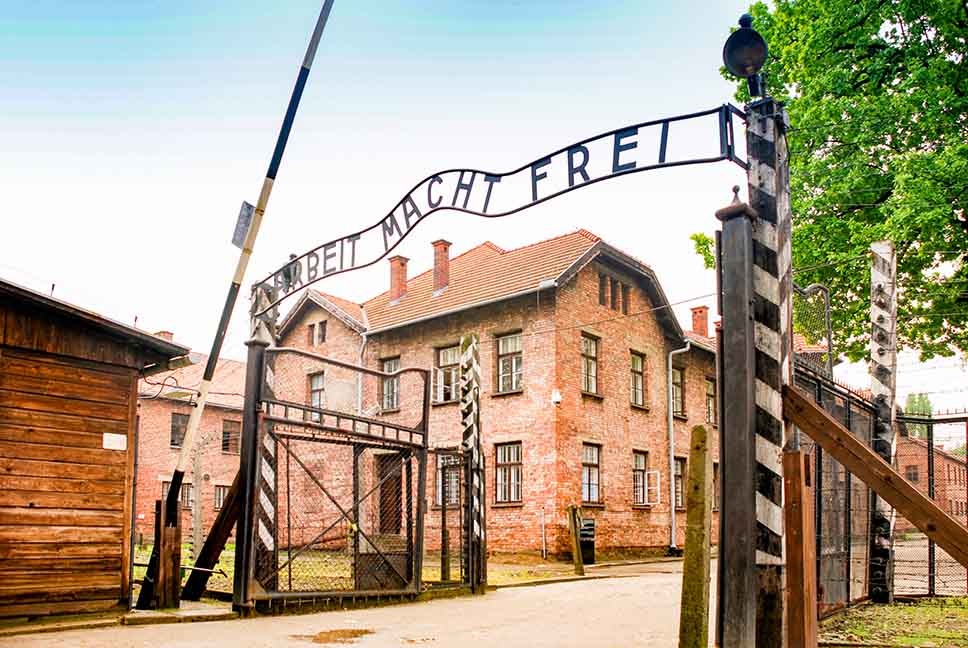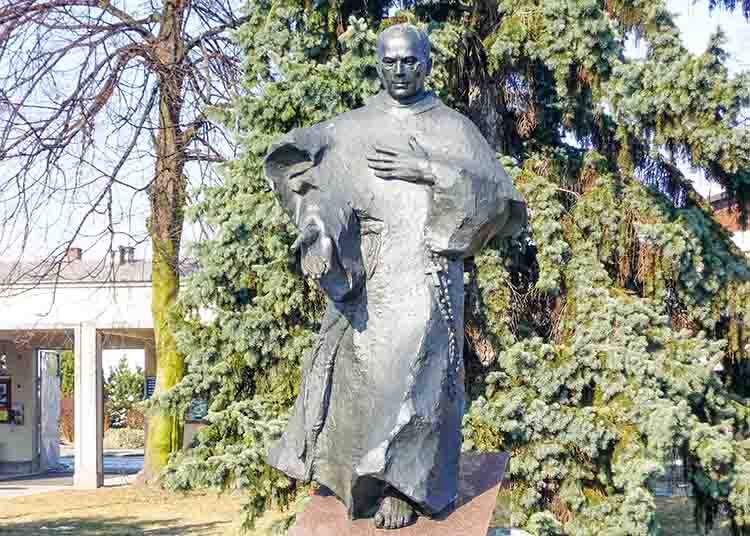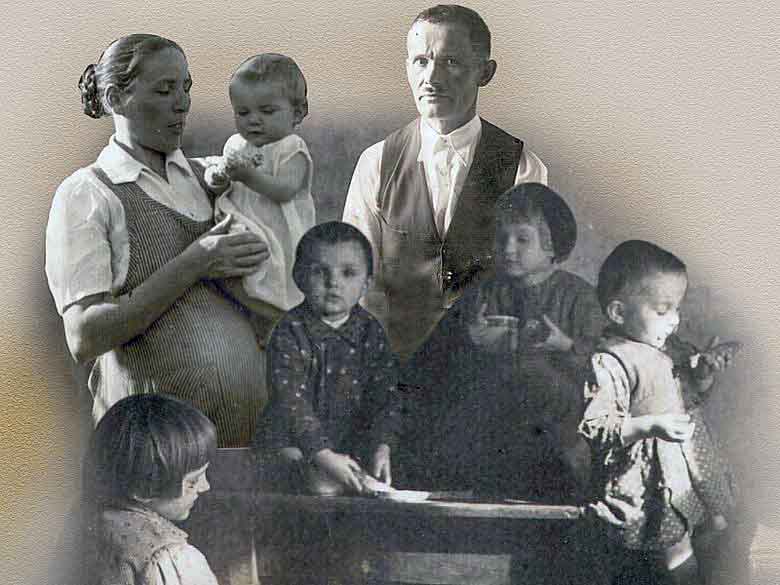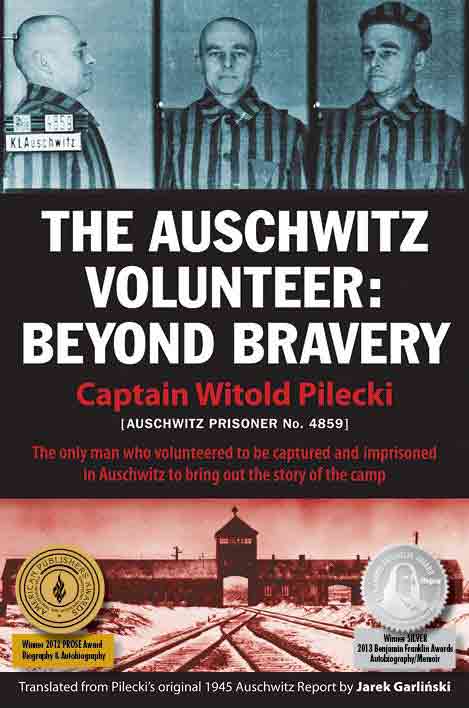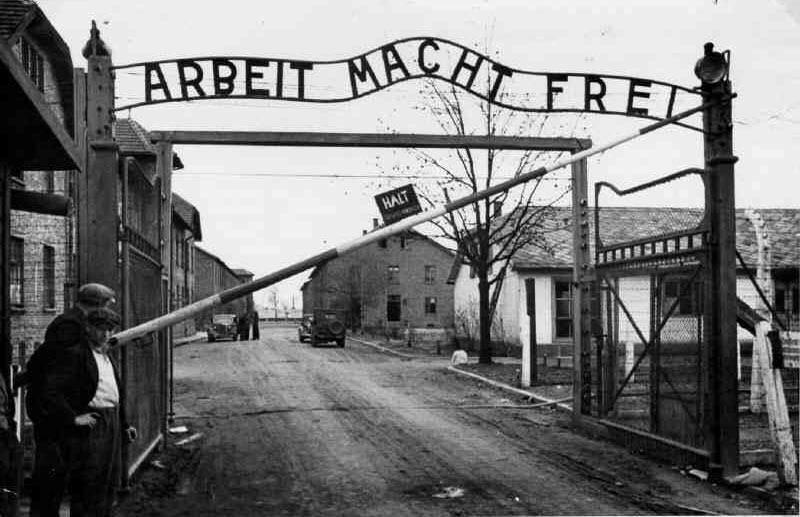May 28, 2021 marks the 80th anniversary of Fr. Maksymilian Kolbe - the guardian of Niepokalanów, a Franciscan monastery and a large publishing house - having been imprisoned in the German concentration camp at Auschwitz. On this occasion, the Franciscan Publishing House «Fraternal Call» in Krakow will be publishing a volume of poetry by Kazimierz Braun entitled "Songs of Saint Maximilian and other poems".
Interview with the author by Fr. Prof. dr hab. Piotr Tomasik.

Maksymilian Maria Kolbe (Source: Radio Maryja)
Fr. Piotr Tomasik: Benedict XVI in 2010, during the general audience, said: “Each of us has close people in our lives who are especially dear to us; some of them are already at the Father's house, others are still walking with us on the way of life: they are our parents, relatives, educators, people to whom we have done good or who have done good to us; we know that we can count on these people. However, it is also important that we have “traveling companions” on the path of our Christian life: I mean a spiritual director, a confessor, people with whom the experience of faith can be shared, but I also think of the Virgin Mary and the saints. Everyone should choose a favorite saint who will be especially dear to him in prayer and intercession, and whom he will follow. " Is your traveling companion St. Maksymilian Maria Kolbe, since you wrote a play about him, and you titled this volume in his honor? From what sources did you gain knowledge about this Saint?
Kazimierz Braun: This is one of the most beautiful adventures of my life, and also a long, bumpy road. Of course, from my childhood, I knew that there was a monk who went to death in Auschwitz instead of another prisoner. I knew that in 1971 he was beatified. And it so happened that I was in Japan in the fall of 1981. Using the Japanese Foundation Prize, I was able to plan my trip around this country. Outlining the itinerary of this trip, I asked to be able to go to Nagasaki and visit the monastery that Father Maximilian Kolbe built there. I was there. I walked the corridors and paths trodden by him. I met Brother Sergiusz, one of the students and associates of the guardian of the time, who gave me generously his time and shared stories, showed me around the Japanese Niepokalanów - Mugenzai no Sono: church, monastery, school, chapel of the Immaculate on Mount Hiko. Brother Sergius also gave me a lot of material. I began to consider the thought of writing about Father Maximilian. Right after my return to Poland, General Jaruzelski declared martial law. The moment of history imposed other themes, works and activities.
But it so happened that, at the end of September 1982, I was with my Contemporary Theater in Ireland, where we played Anna Livia by James Joyce, at the festival celebrating his 100th birthday. And there, at the Irish National Theater, The Abey Theater, to my surprise, there was a play on the poster called Kolbe. I went to see it. The author was the priest-poet Desmond Forristal. The play was an epic story about the martyrdom and death of Father Maksymilian Kolbe in the hell of Auschwitz. Based on it, the theater had built a great production, with a very large cast. The spectacle about a Polish saint in Dublin touched me enormously, although the play itself did not really convince me. However, I ordered its translation from Krzysztof Romanowski, a Polish filmmaker working in Dublin.
The canonization of Maksymilian Kolbe, carried out by Pope John Paul II on October 10, 1982, was a powerful stream of light in the darkness of the martial law in Poland. Such a clear reminder of an indomitable Pole was an important message for all Poles. Martial law was already formally abolished, but continued as a totalitarian, repressive system. For me it was another impulse, somehow directed towards - already then saint - Maximilian. I went to Niepokalanów to ask him for protection in writing about him. I have published two articles about him. They became chapters in the book The Excess of Theater (Nadmiar teatru, Czytelnik, 1984). I received a translation of this Irish play, Kolbe, from Romanowski. Its horizon, upon careful reading, seemed to me somehow too narrow compared to the vastness of those horizons which the saint embraced and opened. I have not decided to implement it. And at the same time, I realized that I still know too little about St. Maximilian. The case was postponed.
Then I was carried away by a whirlwind of events that completely changed my life and work, as well as the life of my family: expulsion from the theater as a punishment of the communist regime for opposition activities (1985); a job offer in the USA sent by my American colleagues who sympathized with me; repeated refusals to issue me a passport and to receive it after subsequent applications; a trip to the USA (1985); work at American universities and American theaters; arrival of my wife, Zofia, and two children, Grzegorz and Justyna, also after the refusal of passports and subsequent applications. (Our eldest, Monika, already had her life settled in Poland). Then - attempts to return to the old country. Failed. (That's a completely different story.) I settled in America.
Actually, a somewhat accidental exchange of e-mails with Father Dr. Piotr Cuber about St. Maximiliana ordered me to come back to him. We have known Fr. Piotr since his stay and work at the Franciscan radio station "The Hour of the Rosary" in Buffalo in 2001. We stayed in touch. We sent each other Christmas greetings. Now, and it was in 2009, he kindly and pleasantly encouraged me to try to write a drama about the saint to remind him of the 70th anniversary of his death in 2011. Following the encouragement of Fr. Piotr, and thanks to the invitation by the Krakow Province of the Conventual Franciscans, I found myself in the convent in Harmęże near Oświęcim for a whole month. I was able to enter the rhythm of the Franciscan life and prayer, to have many interesting, inspiring conversations and to visit many places, in which the saint left his traces, mainly in the Auschwitz camp, as well as in Kraków, Kalwaria Pacławska, Sanok and, of course, Niepokalanów. I could meditate where the saint did. I received a lot of information, many books. All this allowed me to try again to create a drama about St. Maximilian. Out if this arose Maximilianus, and then Father Maksymilian's Cell (monodrama) and the drama My Son, Maksymilian. All of them were published by the Franciscan publishing house Bratni Zew in 2010.
In 2011, I directed Father Maksymilian's cell at the L. Solski Theater in Tarnów. The play was also staged (in English) in Buffalo, USA. In all these plays, the epilogue is the Passion of Saint Maximilian, which can also function independently. It was read by three readers - just like the Passion of Jesus Christ during Holy Week is read in churches in Poland, Canada and the United States. I wanted to continue learning from St. Maximilian, to be somehow close to him. It was from this desire that the opening Songs of Saint Maximilian arose. And as you say: Saint Maximilian has become my "travel companion" in recent years. His rules of life are both a signpost and a reminder of how much I fail to meet his high standards.
Fr. Piotr Tomasik: In the part of the volume entitled Imitations, you included several poems about various saints. What was the selection criterion?
Kazimierz Braun: These were reflections after reading the writings of various saints. Each of these readings contained an enormous wealth of thoughts, recommendations, and spiritual advice. I tried to find a short poetic form, summarizing in a way, that would open these readings, as well as the stories of the lives of these saints, for myself and for others - for the readers.
Fr. Piotr Tomasik: Among the saints we approach through your poems, there is also St. Augustine. In a special context - theater. You are a director, a theatrologist, and you write about St. Augustine: "From the moment of your conversion / you turned away from the theater / you broke with the fatal addiction of theatromania". Why so? I am asking this because today many people in Poland avoid theater, especially they are afraid to lead their children there because of the obscenity and godlessness of the performances. So what should the theater be like?
Kazimierz Braun: This question - "what should the theater be like?" - I asked myself since I started moving towards theater. It has accompanied me for all the years of my practical work in the theater. "Theater, as far as we know, is an atrium of heavenly affairs" - I read and remembered these words by Cyprian Norwid, even before I started studying directing. It was a vision of a theater which, through what is visible on stage, what can be heard from the stage, through all the matter and machinery of the show - gives an insight into the heavens.
As a student of directing, I received a special impulse to understand and practice theater from - then - the bishop, a professor at the Catholic University of Lublin, Karol Wojtyła and the mentor of the group "Święta Lipka" to which I belonged. When I found myself in Krakow in the winter of 1960, it authorized me to ask for an interview with the "Uncle," as we used to call him. I had two very important evening meetings with him that stretched out into the night. At the end of the first, he instructed me to write a paper on the moral problems faced by the director in his theater work. During the second session, he discussed with me, as a professor, the paper that had been submitted to him, then he put the typescript aside and asked me some questions, noting that he was not expecting an answer from me right now, but rather asking me to think about his questions. And these were basic questions for a theater man: “How will you combine faith with art in your theatrical work? How will you combine the pursuit of the highest aesthetic values and finding expression for them in performances with the desire to convey the most important ethical values, those which come from your faith? How will you combine the carnality and sexuality of the actors and the characters they play with their spirituality in your theater work? How will you lead viewers to the land of spirit through the materiality and sensuality of theater? And, consider, prepare now - what will you choose in your time of trial: career or conscience? The world or God?"
In this way, Bishop Wojtyła directed me to areas of theater, completely, even radically, different from those towards which directing studies led me, which I learned about from books, and which I moved around while participating in the theatrical life. As I contemplated his teaching, it gradually began to rhyme with those chapters of history in which theater tried to evangelize and lead people to heaven in a straightforward way - like European medieval theater, Spanish Renaissance theater, theater inscribed in Paul Claudel's dramas, Jacques' mystery performances. and Copeau, and finally Mieczysław Kotlarczyk's Rhapsodic Theater, in which Karol Wojtyła was an actor and from which he set off towards the priesthood.
This nighttime conversation with him showed me theater in a new light. It sharpened the contrast between what I was doing in the theater then - and many times later, for many years - and that theater which was worthy and one had to go towards. And this is my answer to your question. Theater, as Norwid saw it, as Wojtyła practiced it, should lead people to God - both those who create theater on a daily basis, i.e. the people of theater, and those to whom theater addresses, i.e. the audience.
Your question directs me to reflect on my whole, already such a long journey through theater. From the fascination with theater to the realization of its wonderful, good potentials, but also to recognizing the possibility of spreading evil through theater, of which we have so much evidence today. You mentioned it: vulgar, obscene language, simply indecent images and actions, even sacrilege. Saint Augustine helped me a lot in assessing theater from a moral point of view, in realizing how theater can build human spirituality and also degrade it. In his Confessions, he talks about his fascination with theater and his liberation from it. I wrote:
"I was very attracted to
theatrical performances",
confesses Saint Augustine
"I participated in the sinful
joys of performances,"
he accuses bitterly
"I admired the wicked
lovers on stage "
he beats his chest
"The fiction of the scene separated me
from the truth of God"
he remembers bitterly
It should be remembered that during his time (the second half of the 4th and the first years of the 5th century), Roman theater was already in decline, it was focused solely on entertainment, it was sexualized, it was vulgar, and it used cruelty. (How many analogies with the vast areas of contemporary theater!) So Augustine turned his back on theater. I never wanted to leave the theater. For years, I painstakingly learned how to direct it towards the good, to bear witness to my, though weak, faith in theater, to help others find the path of faith in the wilderness of contemporary culture. Every day I repeat the prayer of the Apostles (Lk 17: 4) "Lord, increase our faith." At the end of this poem, I wrote:
Saint Augustine, you were a
guest at the theater,
could you stop haunting the theater like a house of sinful trysts,
I was at the theater's home,
where should I move out?At the same time, the theater is an old family home,
just like in the Father's house, there are many apartments in it,
you do not have to leave it, destroy it, burn it, it
can be a holy hospice, although it used to be a motel, it
can give a roof over the heads of so many homelessSaint Augustine,
thanks to you, I understood too late,
I believe it's not too late
that, while still living in it,
I must clean my house, make it
bleached, clean it, decorate with sweet flag [plant]
as if for Pentecostand take off the Harlequin's black mask myself,
replace his motley costume with
a white celebratory robe
Fr. Piotr Tomasik: Dostoyevski wrote: "Beauty will save the world". Beauty, as a way of reaching God. This issue has been emphasized quite strongly recently in the catechetical documents of the Church. Beauty, art, poetry. What advice would you give to catechists as an artist?
Kazimierz Braun: Returning to the sources. Directing learners' attention to tradition. And if the subject of the course or classes included art, I would suggest emphasizing the protective role of the Church over art - here it would be worth recalling architecture and all fine arts, with the huge role of stained glass in evangelization, sacred music, religious literature, and finally theater, which after four centuries of absence in the culture of Europe (5-9 centuries), was reborn inside the Church. First as an Easter show, then as a passion show. And the first "Nativity Scene" was prepared by none other than Saint Francis in 1223. The alliance of religion and art, faith and theater manifested itself in a thrilling way in the performances of the Undeterred Prince played outdoors for thousands by Juliusz Osterwa. It strengthened the work of the "church theater" created outside of censorship during the martial law period [in Poland].
Fr. Piotr Tomasik: A dozen years ago I wrote religious textbooks for junior high school. I have included a few of your poems, including Simon of Cyrene and Meditations in Nazareth, According to Ignatius of Loyola . They were read by young people and provoked reflection. I think that they initiated high school students into what the history of salvation and the Church are all about. Which of the other poems would you suggest to young people today?
Kazimierz Braun: For young people who are already growing up, I would suggest my new series, Reflections , which, in a way, accompany the divine prayer. Maybe they could encourage such a daily practice.
Fr. Piotr Tomasik: This volume of your poems suggests many more topics. Let's leave them to the readers. Thank you very much for the interview.
Kazimierz Braun: I thank you with all my heart. God bless you!




